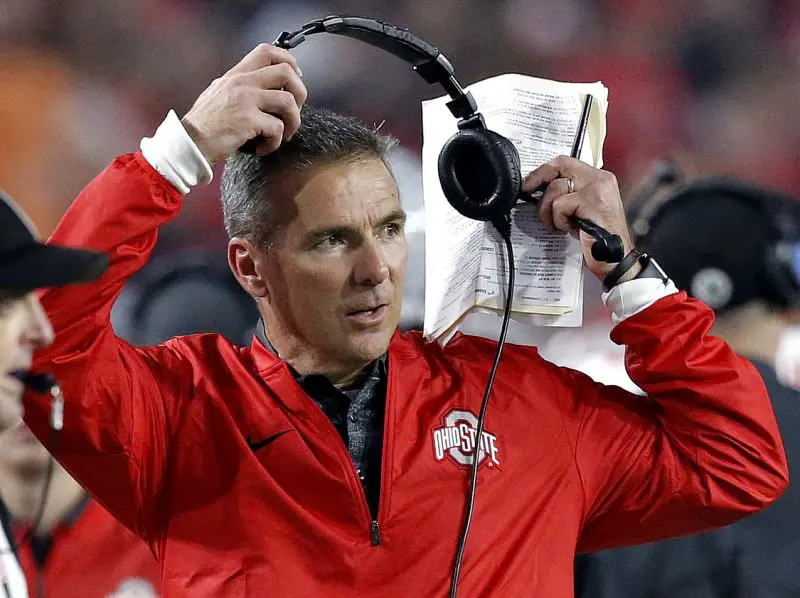The National Collegiate Athletic Association (NCAA) has decided to leave the punishment of head football coach Urban Meyer up to Ohio State. Although they will step in at any moment to suspend a player for doing anything that isn’t in the spirit of competition, they will stand idly by as Meyer gets a three-game suspension for a fireable offense.
Meyer was dealt a three-game suspension on August 22, after an investigation by the university into allegations that Meyer failed to report his knowledge of then-assistant Zach Smith’s domestic violence charges. The committee that came to this verdict was comprised of current Ohio State Trustees as well as three independent investigators.
Smith was fired after a report by Brett McMurphy outlined his history of domestic violence. First, in 2009, aggravated battery against his then-pregnant wife Courtney Smith while working under Meyer at the University of Florida, and then in 2015, while at Ohio State, when Courtney called the police to report domestic violence and stalking.
At BIG 10 media day, the day after Smith’s firing, Meyer denied having any knowledge of the incidents saying, “There was nothing.”
McMurphy’s report shows text messages between Courtney Smith and Urban Meyer’s wife, Shelley, in which they discuss the 2015 incidents. Intuition would suggest that if Urban’s wife knew, then he also knew.
Meyer would later claim that he did his job by reporting the incidents to the school.
Though it is technically possible that Meyer didn’t know about any of Smith’s charges, at the very least he lied on one account. He said, “There was nothing,” at a press conference, but later claimed he reported the incident. Why did he report it if “there was nothing” to report? These two claims are in direct contradiction with each other.
So three games. The committee charged with investigating Meyer seems to think he is guilty of something because if he was innocent, he wouldn’t have received a suspension at all.
The suspension shows that Meyer is guilty, and that is being an enabler to a subordinate coach who had a long-standing record of unacceptable behavior. People would come to Meyer’s defense saying that he didn’t commit the crime, in that he isn’t guilty of domestic violence, but he is certainly an accomplice.
The punishment isn’t enough. On ESPN’s “Get Up!” host Jalen Rose brought up the point that Meyer’s suspension is shorter than many suspensions given to players by the NCAA for much milder offenses.
Meyer’s suspension is even shorter than those given to North Carolina football players for selling shoes given to them by the university.
One might think that isn’t a fair comparison because one suspension was given by the NCAA and in the case of Meyer, by the school that employs him, but that is exactly the point. Why wasn’t the NCAA more involved in investigating Meyer’s knowledge of the incidents?
It seems the NCAA cares more about making sure its players don’t make money from something that was given to them than it does about one of its most prominent coaches allegedly covering up domestic violence.
It’s not the NCAA’s job to police paid employees of its schools or to convict them of domestic violence, but they should be more involved in vetting who its athletes are exposed to.
On the NCAA’s website, the Office of The President page says, “Our mission is to be an integral part of higher education and to focus on the development of our student-athletes.”
“The development of our student athletes” should also involve making sure that the players aren’t being coached by domestic abusers or people who enable domestic abusers.
There is very little evidence that the NCAA couldn’t start an investigation into Meyer and ultimately suspend him further if they chose to. It enlisted the help of the FBI when it suspected that its basketball players might be getting paid.
It seems that the reason they won’t, and the reason Ohio State only suspended Meyer three games, is that they both care more about the revenue brought in by college athletics than the lives surrounding it.
The NCAA should further investigate the head coach of one of their biggest brands, but they won’t, and Ohio State only suspended Meyer three games because they care more about winning and the money that comes with it than they do about protecting people like Courtney Smith.
DISCLAIMER! The views and opinions expressed here are those of the author and do not necessarily reflect the editorial position of The College Post.

